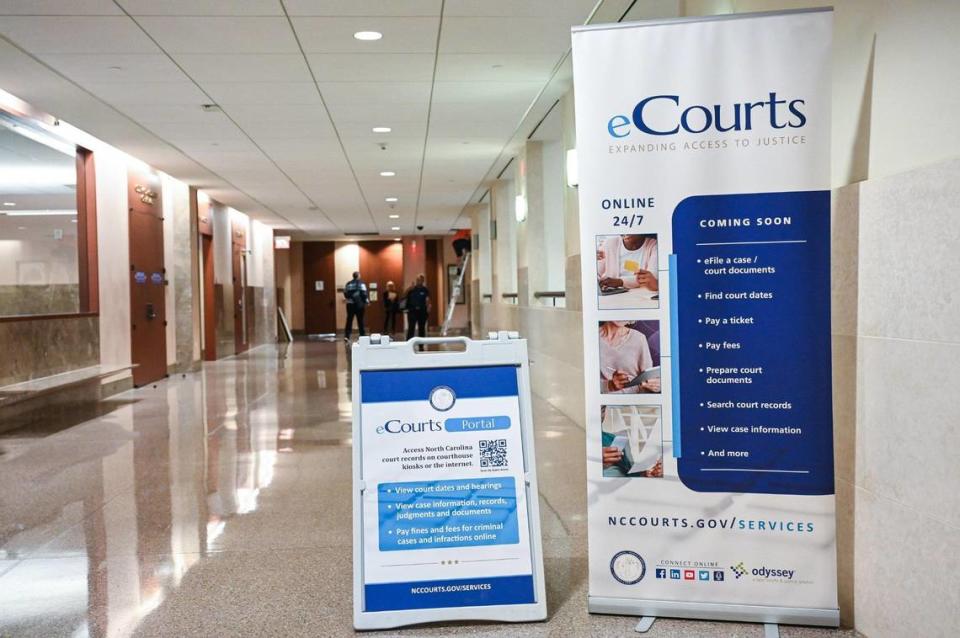ECourts launches in Mecklenburg County Monday. What you need to know for the rollout.
The Mecklenburg County courthouse is undergoing a historic overhaul Monday, when it makes the switch to eCourts, the state’s digital court records and case management system.
Years in the making and with a price tag of $100 million, eCourts promises to create a more modern courthouse. It allows anyone with an internet connection to check records and to file documents online.
The North Carolina Administrative Office of the Courts, the agency overseeing the change, and supporters say it will make the courthouse more accessible and efficient.
But it’s not always quick or user-friendly, and could even be a risk to North Carolina residents’ constitutional rights, some lawyers contend.
As the big switch nears, here is what you need to know about changes coming to Charlotte, which hosts the state’s busiest courthouse.
What’s changing?
Lawyers and courthouse staff have been prepping for weeks by practicing with the new system and pre-scanning thousands of cases, uploading them to the cloud.
Starting Monday, the expectation will be for new paperwork — like a civil complaint or a judge’s order — to go online, according to the county’s clerk of Superior Court, Elisa Chinn-Gary.
Not every file already in the Mecklenburg County courthouse will move to the cloud, though. You can still find old paper files at the clerk’s office, Chinn-Gary told The Charlotte Observer.
How do I use it?
ECourts is a collection of software packages designed by Texas-based vendor Tyler Technologies. Each package has a different use.
File & Serve is a platform to file documents electronically. If you’re a lawyer, you can register for a firm account. Anyone else can register for an individual account.
Guide & File helps people representing themselves in court submit common legal filings — like a small claims complaint, a domestic violence protective order or a name change — with tutoring on how to do it correctly, AOC spokesperson Graham Wilson said. He compared it to at-home tax preparation software.
Portal is a free, electronic, no-registration-required records search system. With eCourts already launched in Wake, Harnett, Johnston and Lee counties earlier this year, Portal is available to experiment with.
You can find more information on each piece of software, as well as updates from the AOC, at nccourts.gov/ecourts.

What are the concerns?
Some court proceedings may take longer than usual in Charlotte beginning next week.
Since its launch in four pilot counties, eCourts has been a source of frustration for some attorneys and clerks who say that it’s buggy and unintuitive.
District attorneys from pilot counties have complained that the system’s lagging performance can slow down court operations, especially for high-volume dockets, The News & Observer reported.
In mid-September, Wake County court officials were locked out of eCourts in one courtroom, shutting down proceedings there, The News & Observer reported.
The problems go deeper, some say. A potential class action lawsuit alleges that eCourts’ issues have led to wrongful arrests and defendants spending extra time in jail. Two plaintiffs are named, and more are expected to add their names to the list, their lawyers say.
The AOC has denied that eCourts led to any wrongful jail time.
This week DMV Commissioner Wayne Goodwin said that eCourts isn’t ready to expand to Mecklenburg. Since late August, he’s urged court leaders to pause that plan. His staff has been forced to review and correct nearly 19,000 errors in court records transmitted to the DMV since the pilot launched in February, an agency spokesperson told The Raleigh News & Observer.
Most of the errors come from data that falsely indicates a fatality occurred in incidents resulting in driving-related convictions, DMV has said. Thousands more stemmed from cases where other information was missing or possibly incorrect.
That could mean dangerous drivers stay licensed and on the road, and others with suspended licenses are stalled from being able to drive again, Goodwin said.
Wilson, the AOC spokesperson, said courthouses in the eCourts pilot counties are not sending bad data to the DMV. At the agency’s request, he said AOC has made several fixes to the eCourts system, the most recent of which was implemented Sept. 28 — 11 days before Mecklenburg’s launch, the News & Observer reported.

